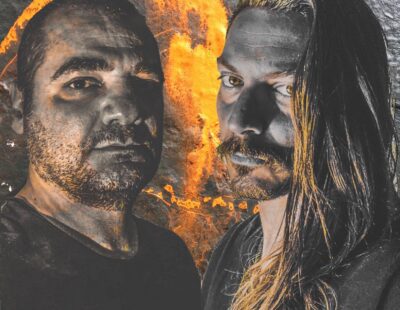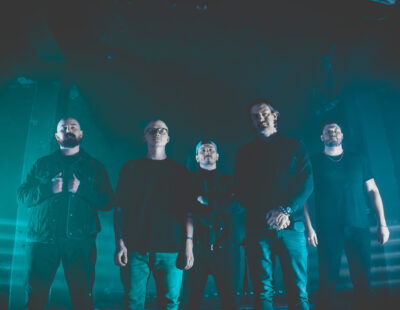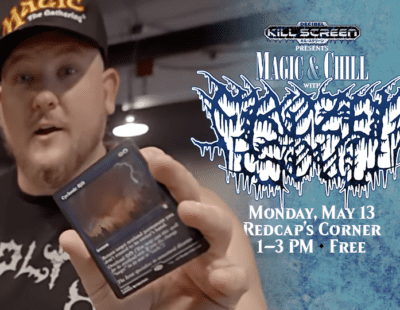Earlier this spring I interviewed Rune Grønn of Turbonegro, and one nugget he shared was that the biggest reason why the Norwegian band embraced gay imagery in the 1990s was because they knew it was the one thing that would scare away their peers in the Oslo black metal underground. No musical genre is untouchable, as all musical forms deserve a good skewering once in a while. The Soft Pink Truth’s Why Do the Heathen Rage?, however, is attracting a lot attention in the way it tackles black metal, serving up covers of grim classics, only done as straight-faced gay house renditions. You haven’t heard anything until you’ve heard Wye Oak’s Jenn Wasner croon Sarcofago’s “Ready to Fuck” atop a sumptuous house arrangement. As Drew Daniel describes, this record is simultaneously a celebration, critique, mockery, and profanation. It’s a welcome, brilliant subversion and inversion of a genre that takes itself comically seriously at times.
It’s a fantastic gimmick by the musician best known for his work in the electronic outfit Matmos, but like good satire, it goes much deeper than trite lampooning. As a hardcore black metal fan who happens to be gay, Daniel also used Why Do the Heathen Rage? as a way to come to terms with the homophobia that clouds black metal’s history, and continues to be an issue. Plus, it’s also fun to get a rise out of the kvltists, and waving a gigantic dildo in a video for a Fischerspooner-style cover of Venom’s seminal “Black Metal” will do just that.
Decibel is more than happy to premiere The Soft Pink Truth’s video for “Black Metal”. Watch, and brace yourself. Why Do the Heathen Rage? will be released June 17 via Thrill Jockey.
The Soft Pink Truth – Black Metal from Thrill Jockey Records on Vimeo.
In addition, Drew Daniel, who is currently on tour in Europe with Matmos, was more than happy to chat via email about the video, the album, and the potential backlashes he faces.
This video is insane. Tell us how the idea came about, and how much fun (or not!) it was to film.
Drew Daniel: I have known Max Eilbacher since he was a sixteen year old kid playing saxophone in the noise band Needle Gun. He’s blossomed into a really talented electronic musician (check his LP for Spectrum Spools for evidence of that) but he also makes hilarious and very odd video art, which typically involves a lot of primitive animation and 3-D modeling. I saw a video of a 3-D hash pipe and some pentagrams that he created for a Halloween party and thought he would be the perfect person to direct a video from this album. He went way beyond my expectations by proposing three distinct location shoots: one in my office at Johns Hopkins University where I would declaim the lyrics in corpsepaint next to my laptop and printer and scholarly books, one in the woods outside the Tribal Haus (a noise warehouse in Baltimore) where Bryan Collins would vogue in corpsepaint while flinging a vampire cape around among the trees, and a third shoot of Bryan and my friend David Serrotte voguing in black metal gear in the basement of the Bank (the warehouse space where he lives, legendary noise venue in the West Side of town). Instead of just making some funny 3D animations and looping them, Max went in for some very ambitious and intensive location shooting, getting us to lipsynch and vogue and generally freak out to my Venom cover over and over and over, calling for particular props and set ideas, and creating a ‘wall of black metal t-shirts” as a backdrop for the voguing sequences. Then he spent a month chopping all the footage into tiny slivers and re-edited it into the thing of ludicrous beauty that it is today. I’m really happy with how it turned out.
The album walks that line between sincere tribute and wicked, savage satire. With the craziness of the video, will it be even harder for you to explain to folks that you treat black metal seriously?
Daniel: I am hopeful that my love of the details is going to come through- there are a number of “easter eggs” hidden in the song and the video that will reward people who freeze and frame-grab, or who listen carefully and spot the samples. This might well be a “Bestial Mockery” of black metal, but it’s made by someone who cared enough to acquire an actual grimoire for the video shoot.
Your album is deliberately provocative, so it’s going to get extreme reactions. How ready are you for that?
Daniel: Bring it on. I’m not interested in consensus, or in being a sacred cow to politically sympathetic critics just because I’m a fag; being gay is not an achievement in 2014, it’s just a fact about who I am. I would say to anyone who is kind enough to listen: Please don’t tip-toe around this record. If you think it sucks, make your case. But don’t tell me that I’m not a real fan, or that I don’t have the right to touch the sacred kvlt heritage. After all: What does all this lip service to being Satanic amount to if you aren’t down for sacrilege?
Your Pitchfork interview makes it seem like you’re dreading severe backlash from both the metal crowd and the gay community. Is that actually the case, or was that more pre-release nerves talking? Because this album is supposed to provoke.
Daniel: I think I was nervous in the talk with Brandon because a Burzum cover is really fucking pushing it, but obviously I wouldn’t have made it public if I didn’t think it was a valid thing to do. And I’m grateful that Pitchfork stuck their neck out by hosting that song and giving me a high profile platform. Explaining something about your politics without coming off like a self-righteous condescending asshole isn’t easy these days; there are so many flavors of self-righteousness out there to choose from, and in the process politics becomes a kind of ethical beauty contest in which people try to make their own status as a “nice person” into a meaningful point of discussion. When you’re talking about issues like structural racism or black metal Nazism, the “but X is a nice guy” line is fucking tired. I didn’t want to fall into that trap. As for my record. . . I hope people dig it but honestly I’m glad if it does provoke resistance, skepticism, or push-back. It was designed to push buttons and if it doesn’t do that, it fails.
How important is it for underground extreme metal to get skewered like this from time to time? It seems no one wants to upset the apple cart these days.
Daniel: To answer that with my own question: Watching people dance around the are-Inquisition-Nazis-or-not issue is a case in point isn’t it?
Should black metal have more of a sense of humor, laugh at its own inherent ridiculousness more?
Daniel: I think it’s a broad church (ha!). There has always been some humor and there have always been some grim fuckers too. I like the obvious humor in Venom and in (recent) Darkthrone, but I also like the malevolent and unrelenting negativity of Gnaw Their Tongues or Striborg too- it would be disappointing if black metal turned into another space in which the same feelgood values are repeated ad nauseam- that’s why Watain’s invocations of black metal as a space of “chaos” or “lawless darkness” appeals to me- they indicate a fantasy space beyond ethics in which anything is allowed- that’s scary because that can mean murder and cruelty, but it’s appealing too in its anarchic open-ness. And if anything can happen in that lawless space of chaos then that has to include laughter, and humor, and satire.
This album is the subject of serious debate among my fellow metal writers and myself. What would you say to those who claim that you’re reducing black metal to a joke?
Daniel: I am having fun, but I am not necessarily being reductive just because I’m having fun. Not that comedy is my only framework here, but even so: comedy is complicated! I think there’s a range of attitudes and stances and subject matters and relationships to black metal on my record; to my mind anyway, each song is its own distinct relocation of black metal, its own act of reassignment surgery in which I transition black metal into industrial, into disco, into vogue ball beats, into house music, and in the process I’m trying to make genres talk to each other. That’s funny and awkward and lopsided and weird, but I don’t see that as reductive. I see it as expansive.
One complaint that arises, especially in the wake of the success of Deafheaven, is how it’s wrong for people to impose their own values on black metal, which should remain forever untouched, grim, and devoutly Satanic. What do you think about that puritanical black metal attitude? Does it have merit, or is it all bunk in this day and age?
Daniel: I’ve gotten into arguments online with people about Deafheaven, because I like “Sunbather” and listen to it often, but I understand why people shoot back that “it sounds like the Flaming Lips, fuck that bullshit, keep it grim”. For me though, I think black metal always was a more flexible template than people admit- if it includes Celtic Frost / Hellhammer and Venom and Bathory as its DNA, then there’s already a pretty wide range of forms and topics and zones that are available, and it only radiates outward form there. To me, what Locrian did and what Cultes Des Ghoules did with their albums last year were both completely valid extensions of black metal at the present time. On “Return to Annihilation”, Locrian found an underground tunnel that links Yes and Genesis to black metal screeches and fast-picked riffs; on “Henbane”, Cultes Des Ghoules just kept things utterly necro and grim and cackled blasphemy. Was one better than the other? No. They’re different. I don’t believe in notions that the old ways are best nor do I believe in naïve doctrines about “progress” or “staying current”; I do believe in change and the freedom of genres to change. Mgla’s set at MDF was just as inspiring to me as Taake’s set- it’s not about safely choosing the old bands because they’re old. That’s piety and I thought this was a scene that contested piety.






